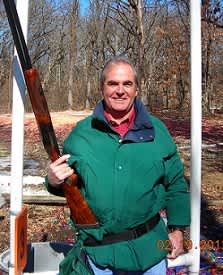Pheasants Forever Hires Wisconsin DNR Veteran as New Regional Wildlife Biologist
Pheasants Forever 03.13.12

Pheasants Forever has named Doug Fendry of McFarland, Wisconsin, as the organization’s new Regional Wildlife Biologist for the state of Wisconsin. Fendry will work at raising and expending funds on wildlife habitat and conservation education, and also with local, state, and federal natural resource agencies on behalf of Pheasants Forever chapters.
Fendry looks to grow Pheasants Forever’s chapter recognition and youth outdoor activity in Wisconsin, which is currently home to 31 Pheasants Forever chapters and more than 7,700 Pheasants Forever members.
A native of McFarland, Wisconsin, Fendry earned his B.S. in Wildlife Management and Biology from UW Stevens Point and his Masters in Public Administration from UW Madison. Over the past 32 years, he worked with the Wisconsin Department of Natural Resources in various positions including Wildlife Technician, Wildlife Biologist and Special Conservation Warden, Chief of Land Management Section – Bureau of Facilities and Lands, Team Leader for the Lower Rock Land Team, and an Area Wildlife Supervisor. His responsibilities varied greatly but primarily focused on the increased wellbeing and active management of wildlife and lands throughout Wisconsin.
“Doug’s depth of knowledge and experience with conservation management and conservation organizations made him the natural choice for the new Wisconsin Regional Wildlife Biologist position,” said Rick Young, Pheasants Forever Vice President of Field Operations. “During his time with the Wisconsin Department of Natural Resources, Doug worked closely with Pheasants Forever, so he knows what the organization is capable of and how we can best use our resources to increase wildlife and awareness in Wisconsin.”
A large part of Fendry’s career consisted of partnering with conservation organizations professionally to accomplish the DNR’s habitat enhancement goals. Personally, he practiced what he preached, starting regional Ducks Unlimited and Rocky Mountain Elk Foundation chapters, and coordinating habitat and pheasant research projects with Pheasants Forever. “Over the course of my life, I am proud to have worked with a number of nonprofit conservation organizations,” says Fendry, “What is unique and what drew me to Pheasants Forever is the focus on habitat projects, the local chapter model and the youth education aspect. I know firsthand how passionate the employees and volunteers are, and I am looking forward to the great things we will accomplish for Wisconsin.”
Fendry lives in McFarland, Wisconsin, with his wife, Mary, and has one daughter, Erin, and a son, Mark. An avid hunter his entire life, Fendry and his 13 year old black Labrador “Willow” pursue pheasants and waterfowl throughout the United States, even though at Willow’s age the hunting trips are now “more about spending time outside with Willow while she’s still able to hunt.” When not participating in the shooting sports, Fendry enjoys paddle sports, camping, and racing his vintage sports car.
Pheasants Forever empowers county and local chapters with the responsibility to determine how 100 percent of their locally raised conservation funds will be spent – the only national conservation organization that operates through this truly grassroots structure. As a result, chapter volunteers are able to see the fruits of their efforts locally, while belonging to a larger national organization with a voice on federal and state conservation policy.
For more information regarding Pheasants Forever in Wisconsin, please contact Doug Fendry at 608-843-7999 / Email Doug. For all other inquiries, please contact Rehan Nana, Pheasants Forever Public Relations Specialist at 651-209-4973 / Email Rehan.

